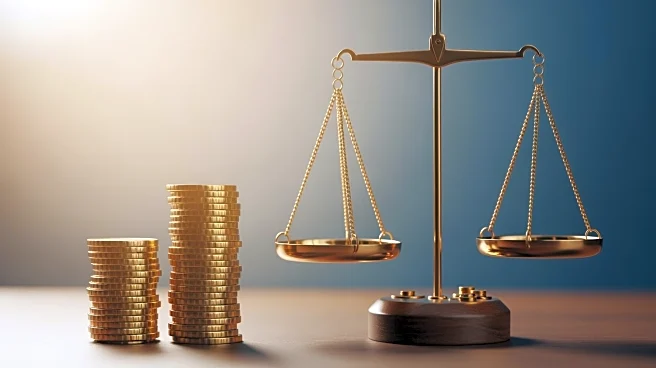What's Happening?
The Supreme Court recently heard oral arguments in a significant case concerning tariff refunds, which could potentially lead to tens of billions of dollars being returned to businesses. The case challenges
tariffs imposed by the Trump administration, with skepticism expressed by both conservative and liberal justices. The federal government has collected nearly $90 billion in revenue from these tariffs, according to US Customs and Border Protection data. The complexity of the refund process was highlighted during the proceedings, with Justice Amy Coney Barrett questioning how reimbursements would be managed if the court rules against the Trump administration. Neal Katyal, representing small- and medium-sized businesses, acknowledged the difficulty of the process, suggesting that only the businesses he represents would be directly eligible for refunds, while others might need to file separate appeals.
Why It's Important?
The outcome of this case holds significant implications for U.S. businesses and the economy. If the Supreme Court rules against the Trump administration, businesses could receive substantial refunds, potentially easing financial burdens and stimulating economic activity. However, the complexity of the refund process could pose challenges, particularly for smaller businesses that may struggle with the administrative requirements. Additionally, investment banks have been offering businesses immediate cash in exchange for their potential refund stakes, indicating the high stakes involved. The decision could also impact future tariff policies and international trade relations, influencing how the U.S. engages with global markets.
What's Next?
The Supreme Court's decision is expected to take months, during which the revenue from tariffs will continue to accumulate. Businesses are advised to prepare for potential refunds by reviewing their importation records and considering liquidation extensions or protests with Customs and Border Protection. The possibility of streamlined or automated refund processes has been suggested, but the specifics remain uncertain. Investment banks may continue to offer deals to businesses, providing immediate cash in exchange for potential refund stakes, which could affect the financial strategies of importers.
Beyond the Headlines
The case raises broader questions about the legal and ethical dimensions of tariff policies and their impact on businesses. The potential for refunds highlights the complexities of international trade laws and the challenges businesses face in navigating them. The involvement of investment banks in offering deals to businesses underscores the financial pressures and strategic decisions companies must make in response to government policies. The case could also influence future legal interpretations of tariff laws and set precedents for how similar cases are handled.









